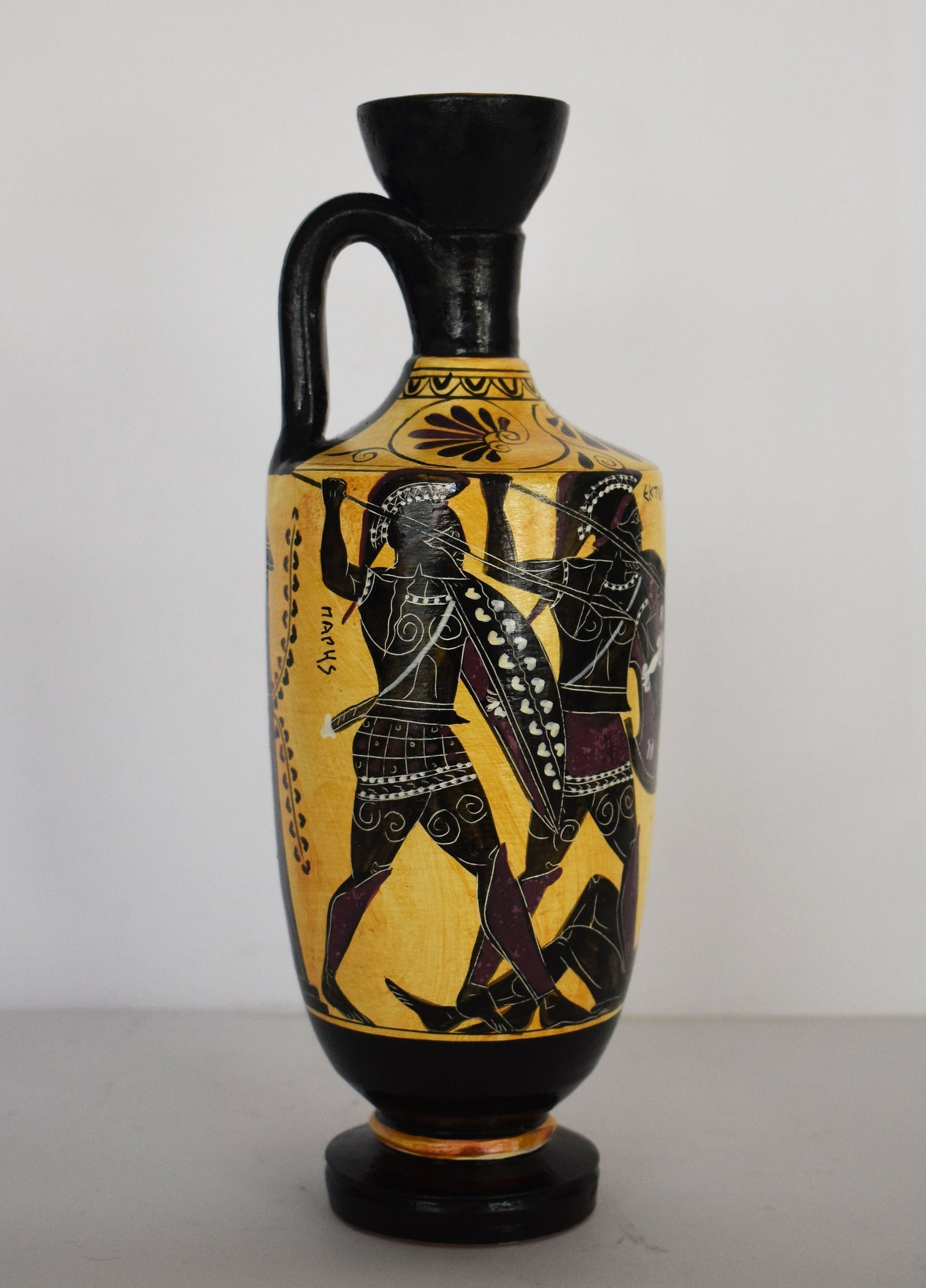Gallery Demeter
Achilles Hector Menelaus Paris Patroclus - Trojan War, Homer's Iliad - Red Figure Vase - Small - Museum Replica - Lekythos
Achilles Hector Menelaus Paris Patroclus - Trojan War, Homer's Iliad - Red Figure Vase - Small - Museum Replica - Lekythos
Regular price
€79,90 EUR
Regular price
Sale price
€79,90 EUR
Unit price
per
Tax included.
Shipping calculated at checkout.
Couldn't load pickup availability
Item Specifics
Vase Details:
Height: 20 cm - 7,9 inches
Width: 7 cm - 2,8 inches
Length: 7 cm - 2,8 inches
Weight: 470 g
A fight breaks out over Patroclus’s body. Euphorbus, the Trojan who first speared him, tries to strip him of Achilles’ armor but is killed by Menelaus. Hector, spurred on by Apollo, sees Euphorbus’s fall and comes to help. Menelaus enlists the help of Great Ajax, who forces Hector to back down and prevents the body from being removed or desecrated. He arrives too late to save the armor, however, which Hector dons himself. Glaucus rebukes Hector for leaving Patroclus’s body behind and suggests that they might have traded it for Sarpedon’s. Hector reenters the fray, promising to give half of the war’s spoils to any Trojan who drags Patroclus’s corpse away.
Aware of Hector’s impending doom and perhaps pitying it, Zeus temporarily gives Hector great power. Ajax and Menelaus summon more Achaeans to help them, and they soon force the Trojans, including mighty Hector, to run for the city’s walls. Aeneas, invigorated by Apollo, rallies the fleeing men to return to the fight, but after much effort they remain unable to take the corpse. Achilles’ charioteer, Automedon, becomes involved in the fighting as Zeus imbues his team with fresh strength. Hector tries to kill Automedon so that he can steal the chariot, but Automedon dodges Hector’s spear and brings a Trojan down in the process. He strips the Trojan of his armor, claiming that in doing so he eases the grief of Patroclus’s spirit, though this present victim could hardly compare to the great Patroclus.
Athena, disguised as Phoenix, gives fresh strength to Menelaus, while Apollo, himself disguised as a Trojan, lends encouragement to Hector. Menelaus sends Antilochus for help from Achilles, who still doesn’t know of Patroclus’s death. Zeus begins moving the battle in the Trojans’ favor but relents long enough for Menelaus and Meriones to carry away Patroclus’s body.A lekythos (plural lekythoi) is a type of ancient Greek vessel used for storing oil , especially olive oil. It has a narrow body and one handle attached to the neck of the vessel, and is thus a narrow type of jug, with no pouring lip; the oinochoe is more like a modern jug. In the "shoulder" and "cylindrical" types which became the most common, especially the latter, the sides of the body are usually vertical by the shoulder, and there is then a sharp change of direction as the neck curves in; the base and lip are normally prominent and flared. However, there are a number of varieties, and the word seems to have been used even more widely in ancient times than by modern archeologists. They are normally in pottery, but there are also carved stone examples.
Lekythoi were especially associated with funerary rites, and with the white ground technique of vase painting, which was too fragile for most items in regular use. Because of their handle they were normally only decorated with one image, on the other side from the handle; they are often photographed with the handle hidden, to show the painted image









